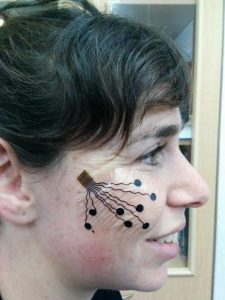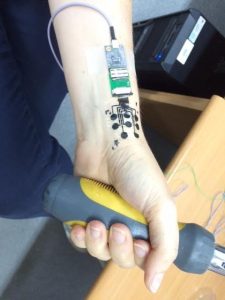A penny for your thoughts? Put your coins away. A new stick-on electronic tattoo could help reveal what people are really thinking.
Developed by Professor Yael Hanein, head of Tel Aviv University’s Center for Nanoscience and Nanotechnology, the user-friendly electrode can be used to improve the therapeutic restoration of damaged nerves and tissue – and could even lead to new insights into our emotional life.
SEE ALSO: Light Beams, Not Pacemakers, Could Be The Future Of Heart Treatments
Stick-on monitoring
Consisting of a carbon electrode, an adhesive surface that attaches to the skin, and a nanotechnology-based conductive polymer coating that enhances the electrode’s performance, the tattoo records a strong, steady signal for hours on end without irritating the skin.
The tattoo allows users to continue on with their regular schedules, while monitoring their muscle activity for many hours, for a range of medical and other purposes. “Our tattoo permits patients to carry on with their daily routines, while the electrode monitors their muscle and nerve activity,” Hanein said in a statement.

Stick-On Monitoring. Courtesy of Tel Aviv University
Mapping of emotions
One major application of the new electrode, already under development, may be the mapping of emotions. “The ability to identify and map people’s emotions has many potential uses,” Hanein said. “Advertisers, pollsters, media professionals and others – all want to test people’s reactions to various products and situations. Today, with no accurate scientific tools available, they rely mostly on inevitably subjective questionnaires. To address this need, researchers worldwide are trying to develop methods for mapping emotions by analyzing facial expressions, mostly via facial photos and smart software. Our skin electrode provides a simple, convenient solution: monitoring expressions and emotions based on the electric signals received from facial muscles.”
Sign up for our free weekly newsletter
SubscribeSEE ALSO: Using DNA Nanotechnology, Israeli Scientists Develop The Future Of Flexible Display Screens
Conducted within the framework of an EU project, and partly supported by the BSMT Consortium of Israel’s Ministry of Economy, the study Hanein led was presented at an international nanomedicine workshop at Tel Aviv University in June.
Nanotechnology temporary tattoos
The new skin electrode is based on a fusion of nanotechnology with a very basic and commonplace product: the temporary tattoos that children love so much. “We used readily available materials and conventional industrial printing techniques, in order to simplify and speed up the development process,” Hanein explained. “Our ‘electric tattoo’ consists of three parts: a carbon electrode, an adhesive surface that sticks temporary tattoos to the skin and a nanotechnology-based conductive polymer coating, with special nano-topography, that enhances the electrode’s performance. The result is an efficient skin electrode that records a strong and steady signal for many hours, and does not irritate the skin. The user just fixes it onto the skin at the right spot and forgets about it, then carries on as usual while the little ‘tattoo’ measures and records muscle activity.”

TAU-Arm. Courtesy of Tel Aviv University
Additional applications
According to Hanein, this is only the beginning. The new skin electrode has many more potential applications: a study initiated recently in collaboration with researchers at the Tel Aviv Medical Center uses it to monitor the muscle activity of patients with neurodegenerative diseases; physiological data measured in specific muscles may be used in the future to indicate the alertness of drivers on the road; patients in rehabilitation following stroke or brain injury may utilize the ‘tattoo’ to improve muscle control; and amputees may employ it to move artificial limbs with remaining muscles.
Photos: Tel Aviv University
Related posts

Editors’ & Readers’ Choice: 10 Favorite NoCamels Articles

Forward Facing: What Does The Future Hold For Israeli High-Tech?

Impact Innovation: Israeli Startups That Could Shape Our Future




Facebook comments